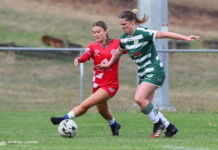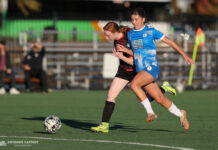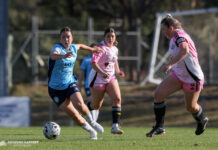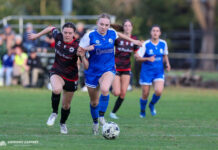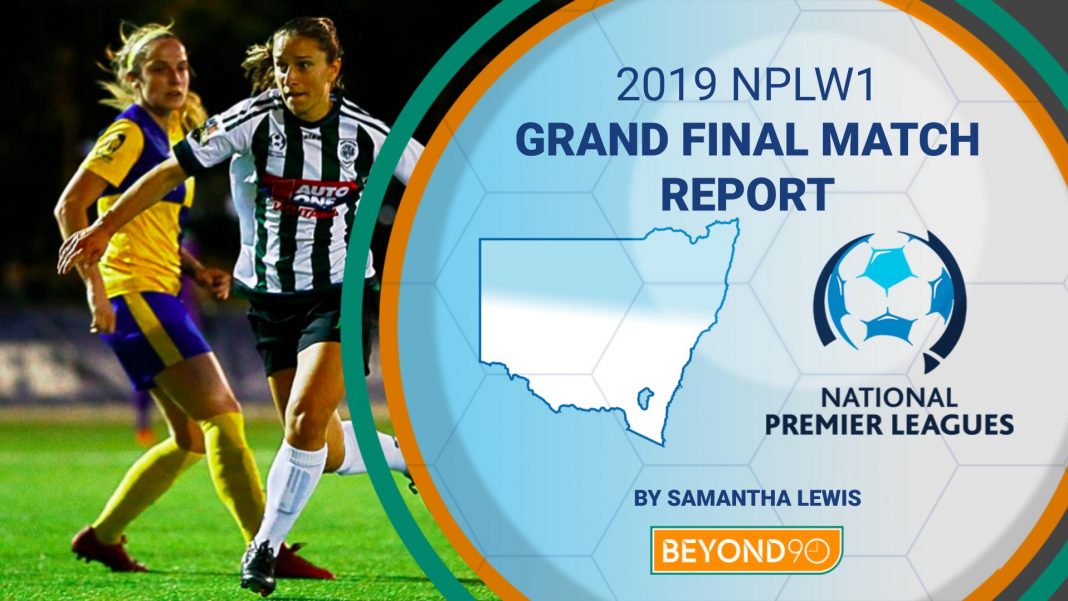
It’s nearing 9pm at Valentine Sports Park in Sydney’s west, and Sydney University forward Nicki Flannery is making the long, lonely walk from the half-way line towards the penalty spot.
The 500-strong crowd—most of whom are here to support the opposition, the Northern Tigers—hums with anticipation. The NSW NPLW 1 Women’s Grand Final has been one of the tightest, toughest contests in recent memory, with the two teams locked at 1-1 after extra time.
Flannery wasn’t meant to be taking a penalty. Her name wasn’t on the list. She wasn’t even sure she would make it out onto the pitch again, having struggled with injury in the final weeks of the season. But this game has been about expectations—about setting them, about exceeding them—so Flannery put her hand up.
She knows what this means, and what it feels like to go home empty-handed, having done all you could do. She was here last year when Sydney University came back from two goals down against the Macarthur Rams, only to lose in extra time. They led 3-2 in the dying stages, but conceded in the 89th minute, and then again in the final minute of extra time.
That image of exhausted Uni players collapsing across the pitch is echoed here. The final whistle signals the end of 90 minutes, and extra time awaits.
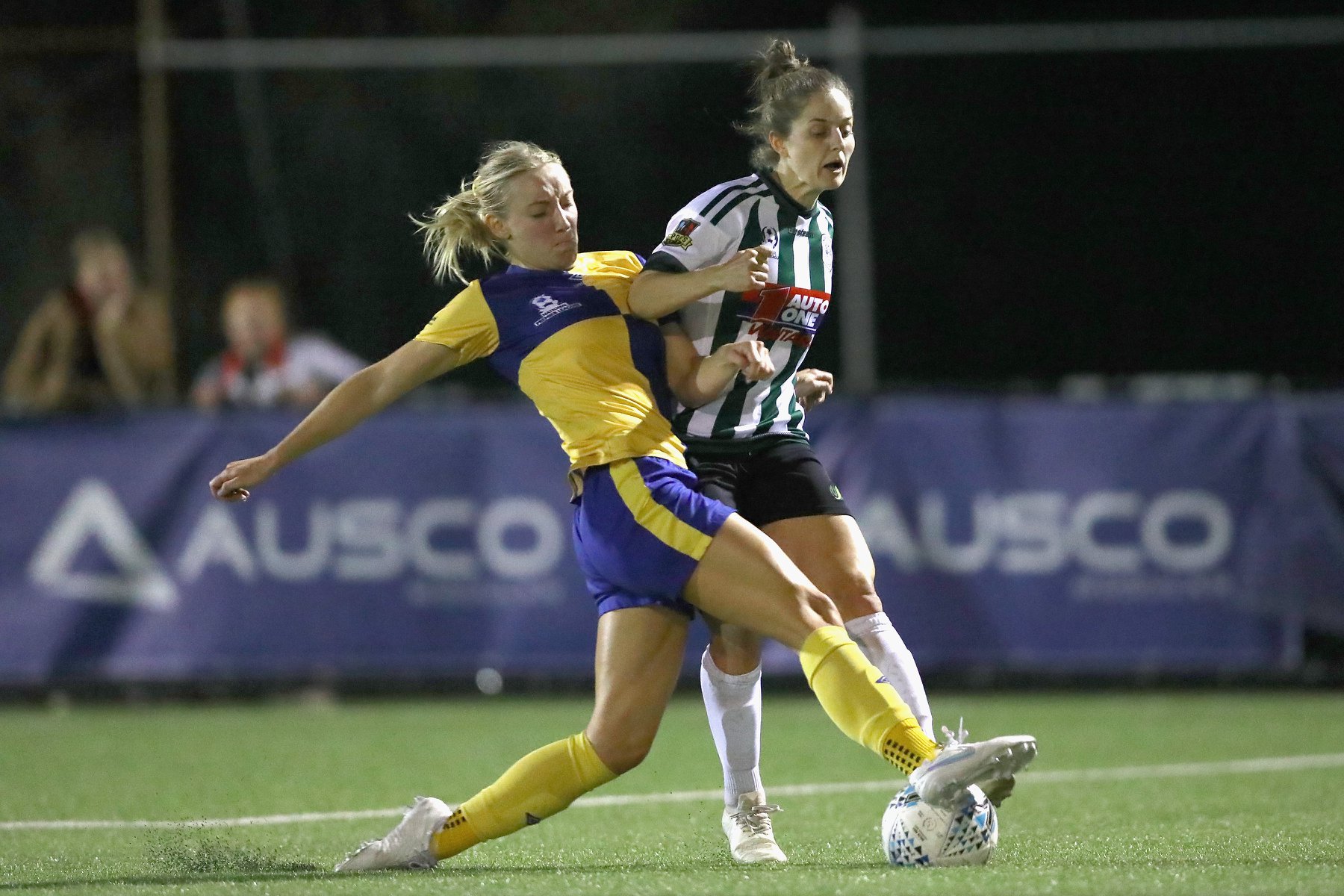
Nothing about this night has gone according to plan.
Two weeks ago, Sydney Uni and the Northern Tigers met in the Major Semi-Final. Uni claimed a fairly comfortable 2-0 win that afternoon, barely giving the Tigers a glimpse of goal. Everybody expected the same in the Grand Final.
But there’s more at stake now. There’s history to be made. Everybody loves an underdog success story, and the Northern Tigers are hell-bent on writing theirs.
A year ago today, the Tigers were watching the final on YouTube from their homes, having finished in the bottom half of the table for the second consecutive season. Unsatisfied, they rallied behind the scenes, pouring more time and resources into their women’s program. They made the top five after just one year and made the final for the first time in their history.
Both of these teams walked onto the pitch earlier this afternoon with expectations, but they approached those expectations from opposite directions.
For Uni, this was a match they were expected to win. They lost just one game all season and didn’t concede a single goal throughout the finals series. They won the Club Championship in record time. They’d made the Grand Final three of the last five seasons. It’s an expectation they’re familiar with, but not one they’ve always lived up to. Heavy sits the crown.
For Tigers, even getting this far was unexpected, though not undeserved. They were confident in that quiet way that prepared people always are. They knew they could win, but they knew it would take everything they had—individually, collectively—to do it. The possibility of seeing their name up in lights less than three seasons after they were kicking around in the league below them is the stuff they make movies about.
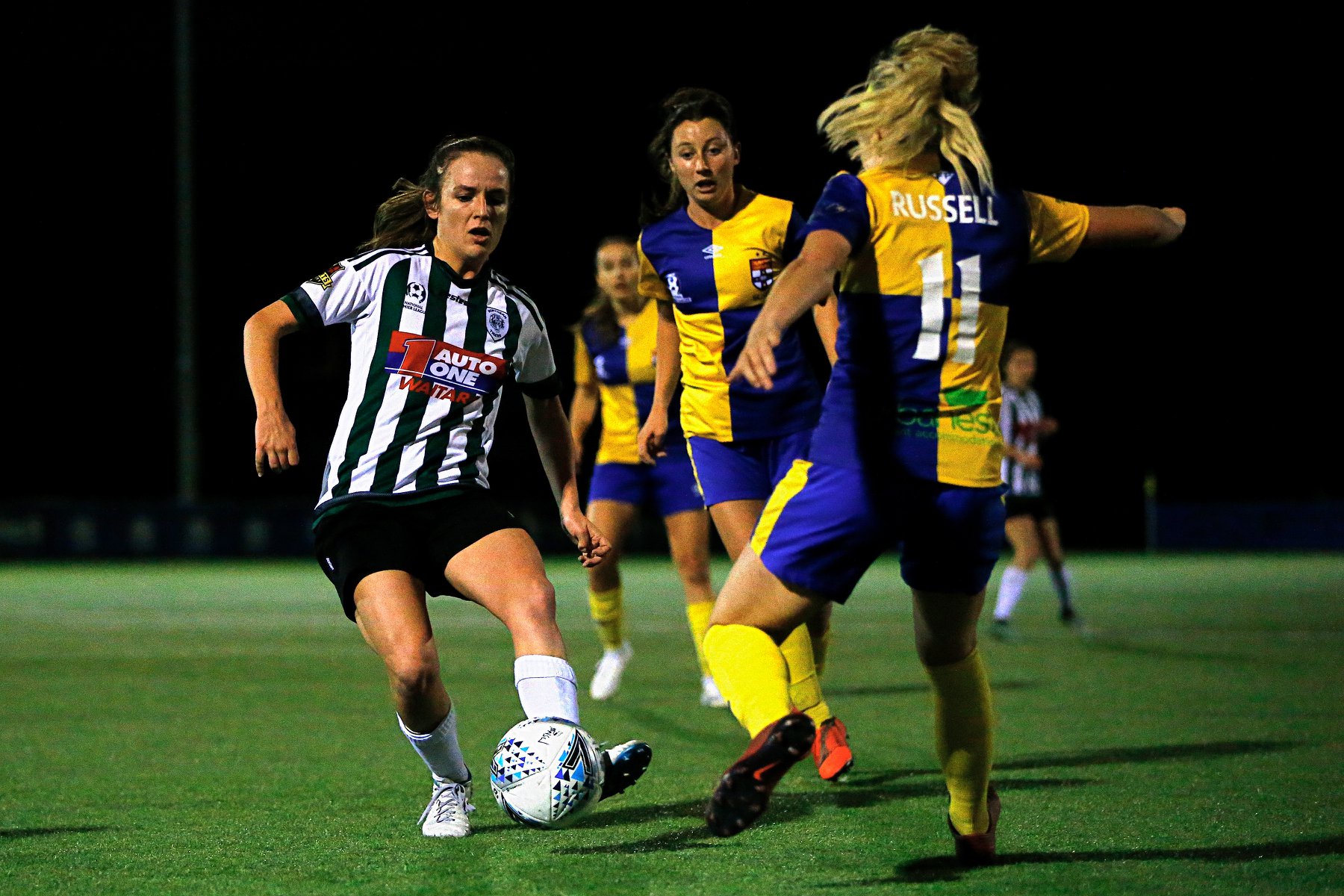
The game that followed was deserving of the occasion, and of the stories both teams had written about themselves over the past six months.
It was more akin to a game of chess than a game of football. The drama took place on the ball, but the narrative of the game—and of these two teams—took place off it, in the spaces and the movements elsewhere. Where Uni stretched the field in possession, tempting their opponents to step out of shape, the Tigers stayed disciplined and compact. Where Uni tried to overload the wide channels with overlapping full-backs, the Tigers neutralised them with a formation change—a front three pinning back one of Uni’s most potent lateral threats. And where Uni’s central midfield tended to dictate play, the Tigers wouldn’t give them an inch—pressing quickly and in numbers, overwhelming the Premiers’ metronomes, forcing them backwards and away.
As a result, the first half was speckled with half-chances: a waved-away penalty shout in the 30th minute, a free kick just outside the box that was poorly hit and easily cleared. It was a half of tactics and of counter-tactics; of trying and failing and trying again. Two coaches trying to out-think each other, moving their pieces around. It was a half that demonstrated why these two sides had the first and second-best defensive records of the entire competition, allowing each other no more than 5 shots on target across the entire 120 minutes of play.
So, when the first goal arrived, it had a feeling to it that only games like this can produce.
54 minutes of sharp, tactical football had passed. Both teams were wrestling for control of the game, the ball barely making it into either side’s attacking third before being brought straight back. For one of the first times in the game, the Tigers had committed players forward down the left side, overloading Uni’s right-sided defenders. An incisive Emma Watkins pass found striker Daisy Arrowsmith in the box, who turned and shaped to shoot. Uni scrambled, throwing themselves in its path, poking a desperate toe at the deflection to clear it away. But the poke fell right into the path of Watkins, lurking free outside the area—her marker having been pulled into the initial fray. With space for days, Watkins put her foot through the trickling ball, rifling it into the roof of the net.
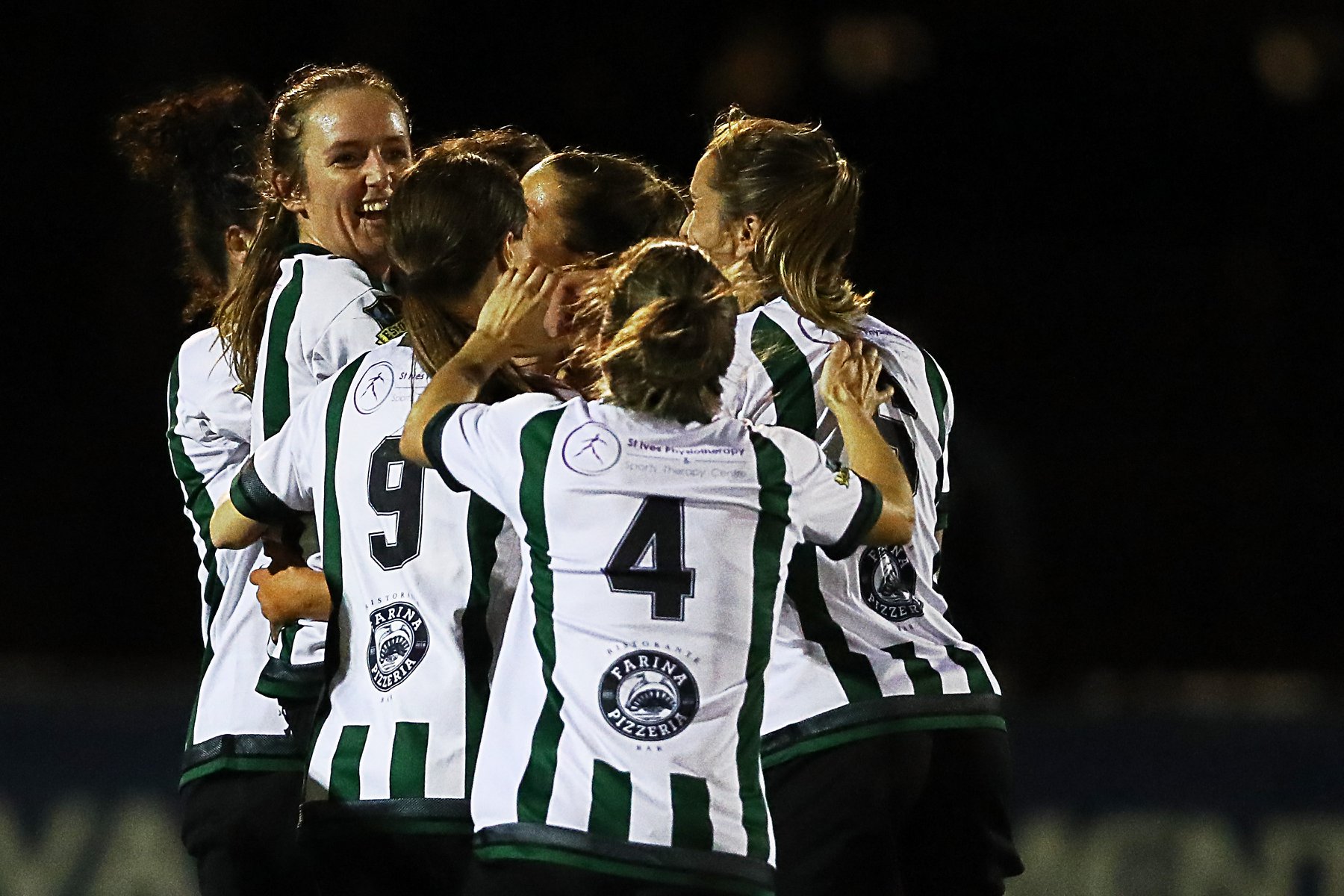
The large contingent of fellow Northern Tigers players and supporters who had set up behind the goal—dressed in their club uniforms, carrying home-made signs and streamers of green and black—erupted. It was the first goal the Tigers had scored against Uni all season. And after what felt like an entire 90 minutes stuffed into a single half, it came at the game like a pin at a balloon that was already close to bursting; a sense of relief, of hope, and of shifting expectations. Maybe Tigers really could pull it off. Maybe Uni weren’t invincible after all.
The goal prompted Uni head coach Alex Epakis to make his first substitution, bringing Holly Caspers off for Nicki Flannery, hoping his trusted attacker could provide some spark, some energy, something different. The two teams wrestled for twenty more minutes before fatigue set in. The game became more open at both ends then, and more desperate. Two more Uni substitutions were made earlier than usual, including taking off a defender for an attacking option. It proved an inspired decision, with Uni gradually gaining the upper hand as the clock wound down.
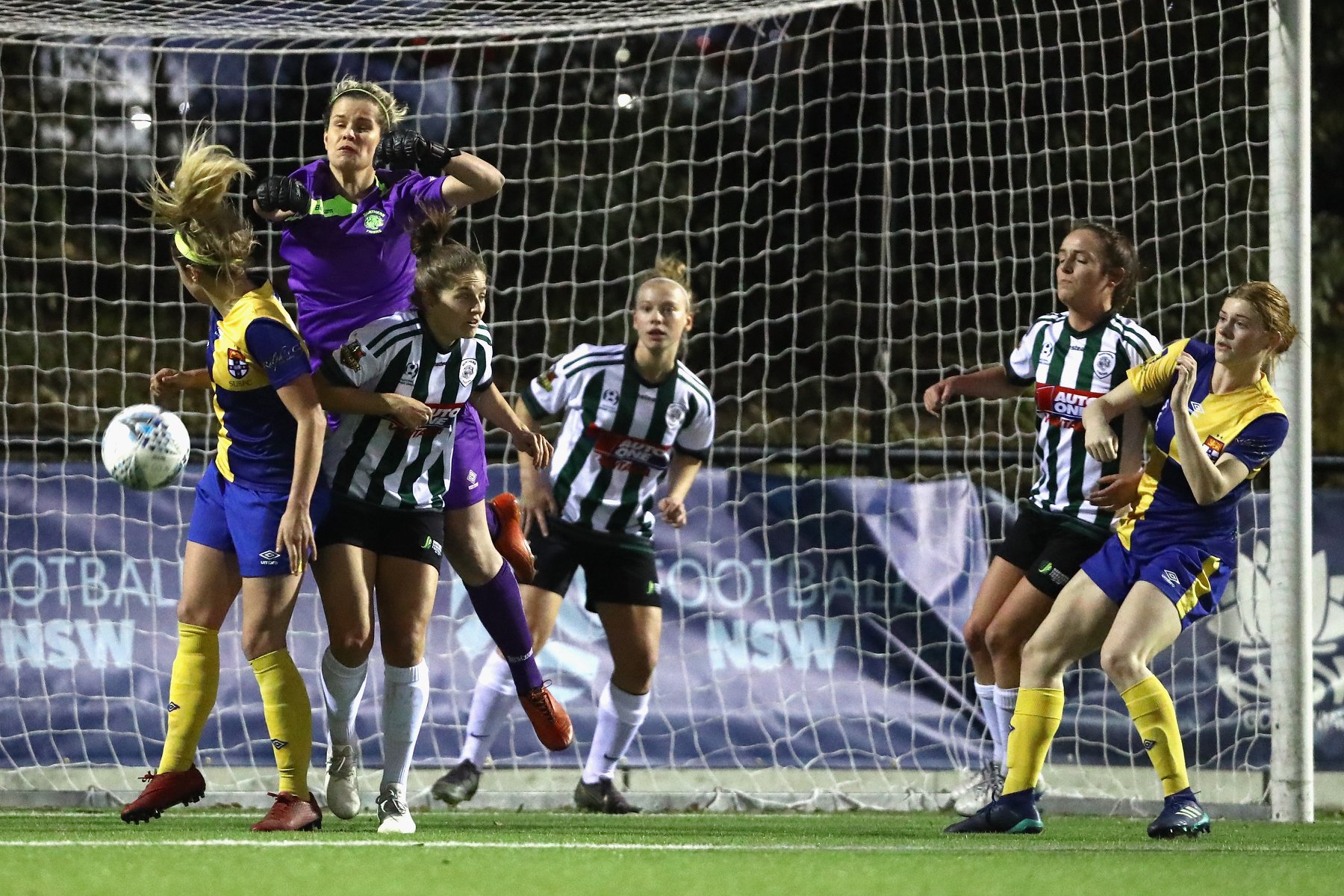
The equaliser felt inevitable, as all the best comeback stories tend to feel. And it was an almost carbon-copy of the opening goal: in the 84th minute, after her initial corner kick was headed back into her path, Rachael Soutar floated the ball toward the crowd of players gathered in the box. Striker Cortnee Vine—who scored the equaliser in last year’s Grand Final—stood completely alone on the penalty spot as the players scrambled and wrestled around her. The ball fell suddenly, prophetically, at her feet, and time seemed to slow to a crawl as she poked it past Tigers goalkeeper Eliza Campbell. The ball had barely rippled the back of the net before she screamed off into the night, followed by her team-mates. Relief. Hope. Expectations.
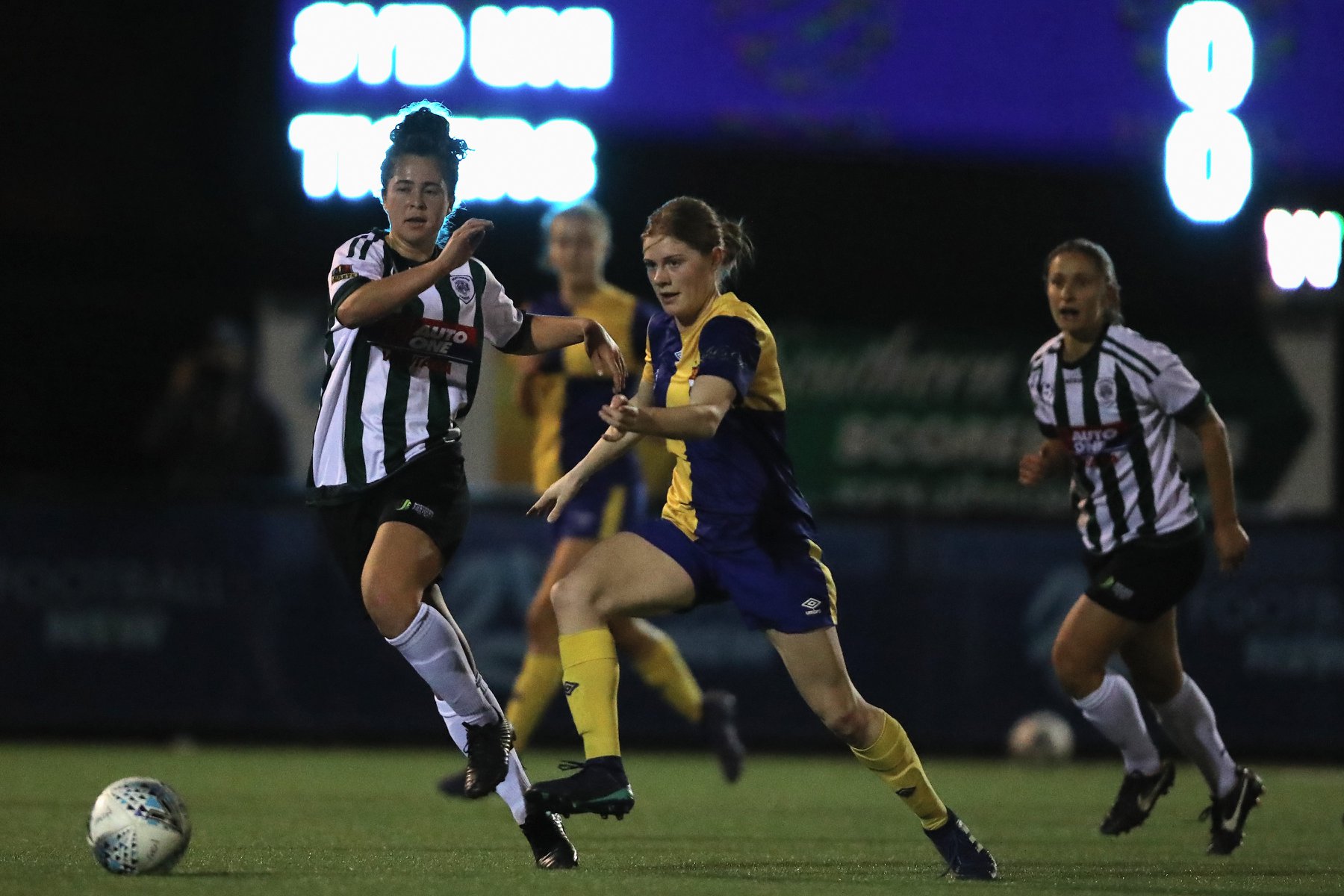
The scores were tied at 1-1 on the final whistle, and extra time loomed.
“This is just like what happened last time,” muttered a woman beside me, her nervous expression hidden beneath a Sydney University scarf pulled up to her ears.
Extra time was a game in and of itself, with both teams drawing on every last atom of energy in their bodies to gain the upper hand. Uni had all the momentum in the opening minutes, driven by the emotion of last year. They kept the Tigers in their own defensive third for most of the first period, but it was the Tigers who had the chance to snatch the win after Uni full-back Annabel Martin was caught out of position by winger Hannah McNulty, who’d latched onto a slicing pass in behind and charged towards the by-line. She squared an almost-perfect pass for Arrowsmith to poke home, but the ball rolled slowly, agonisingly, across goal… completely untouched. The second period of extra time saw the same—a pin-point pass by Tigers substitute Sophie de Montemas found McNulty in the area, but her excitement got the better of her and she skewed her shot over the crossbar.
The whistle sounds in the crisp evening air, the scores still level. There are no expectations or superstitions now; penalties are as much about luck as they are about skill. For a game as defensive as this one, it’s almost fitting that the title comes down to the goalkeepers.
On paper, this is the Tigers’ shootout to lose. With Matildas goalkeeper Eliza Campbell between the sticks, it’s hard to see how Uni custodian Courtney Newbon—who’d not played a minute above the NPLW—can do it. Nobody expects her to, and nobody will blame her if she can’t. But this game has been about expectations—about setting them, about exceeding them—and that’s what Newbon does. Twice. She exceeds them with two huge, diving saves to the right to deny Ellie Brush and Servet Uzunlar, two of the most experienced players on the pitch.
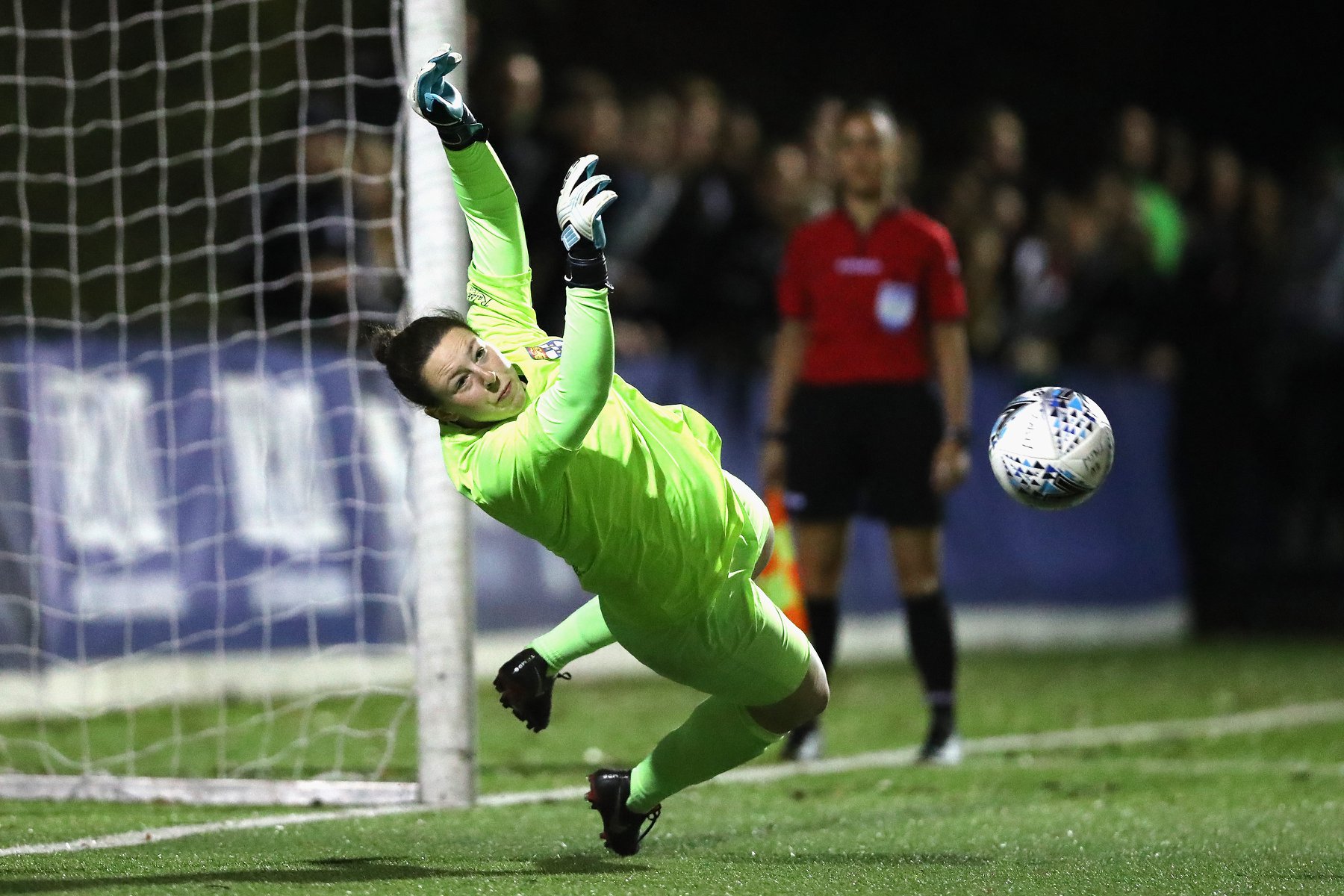
All three Uni players bury their spot-kicks. Arrowsmith sends Newbon the wrong way to get one on the board for the Tigers, but it’s almost too late. There’s just one kick left.
The crowd grows quiet as Flannery places the ball on the penalty spot, her yellow and blue jersey glowing against the inky black sky. She takes six steps backwards and waits, the past two seasons—and the chance to seal the first treble in club history—resting heavy on her shoulders.
The whistle rings out in the quiet night.
And the rest, as they say, is history.
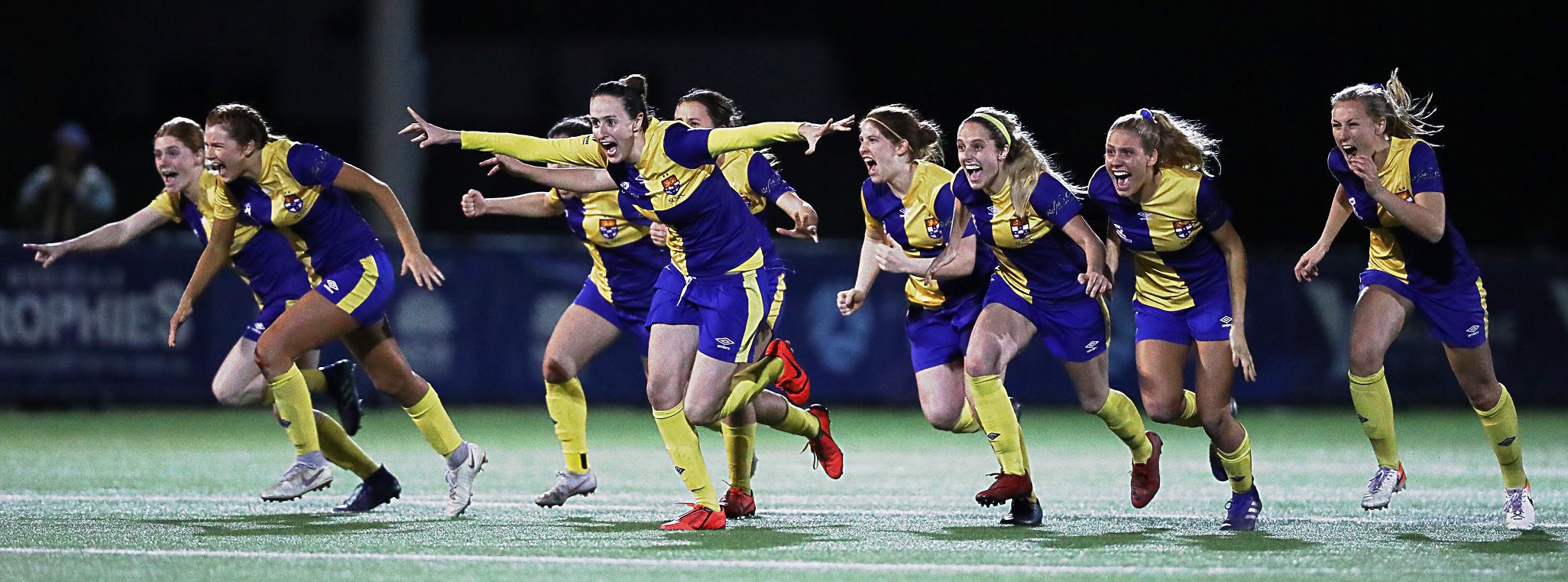
Tigers head coach Jason Eagar was naturally pensive after the match but recognised that his team had just delivered perhaps the toughest test the Premiers had faced all season.
“I’m incredibly proud of the girls and the way they played today. I couldn’t have asked any more from any single player, the starters or the ones who came on,” he said.
“I’d be interested to watch the game back because I think we matched them in a lot of areas that they probably haven’t been matched in before. Even to score against them—I don’t think they’ve been scored against for a while. And to be honest, probably had two of the better chances in extra time.
“Just incredibly proud of the girls and what they’ve achieved, not only tonight but to get to this point in the season. I don’t think the girls could have done anything more, they gave it everything they had.”
Shoot-out saviour Courtney Newbon shared Eagar’s sentiments.
“Tigers played a brilliant game,” she said.
“I did do a bit of research in terms of people shooting, but to lose in penalties, that’s obviously not the greatest way to lose, but that’s life.
“We’ve worked hard all season. To win all three trophies with a great bunch of girls, it’s so well deserved. Hopefully I’m back here at Sydney Uni next year and we’ll go for another Premiership and another Championship!”
After coming up short this time last year, and after leading one of the most dominant NSW NPL Women’s teams in the competition’s history, Uni head coach Alex Epakis was noticeably relieved to have the club’s name finally engraved on that elusive Championship trophy.
“You hear the cliché, ‘you can’t put words to it.’ Now I know exactly what that means,” he said.
“90 minutes, 90 different emotions, then all the extra time and all the emotions through that, and then the penalty shoot-out. Courtney Newbon with the saves was immense. I wouldn’t say it was lucky because this time last year we were in the same position and we walked away with heartbreak.
“Relief is the best word. We knew deep down that we had trained the hardest, we worked the hardest, we put the most commitment in. And we wanted to make sure that we had everything to show for that. And now we do.”
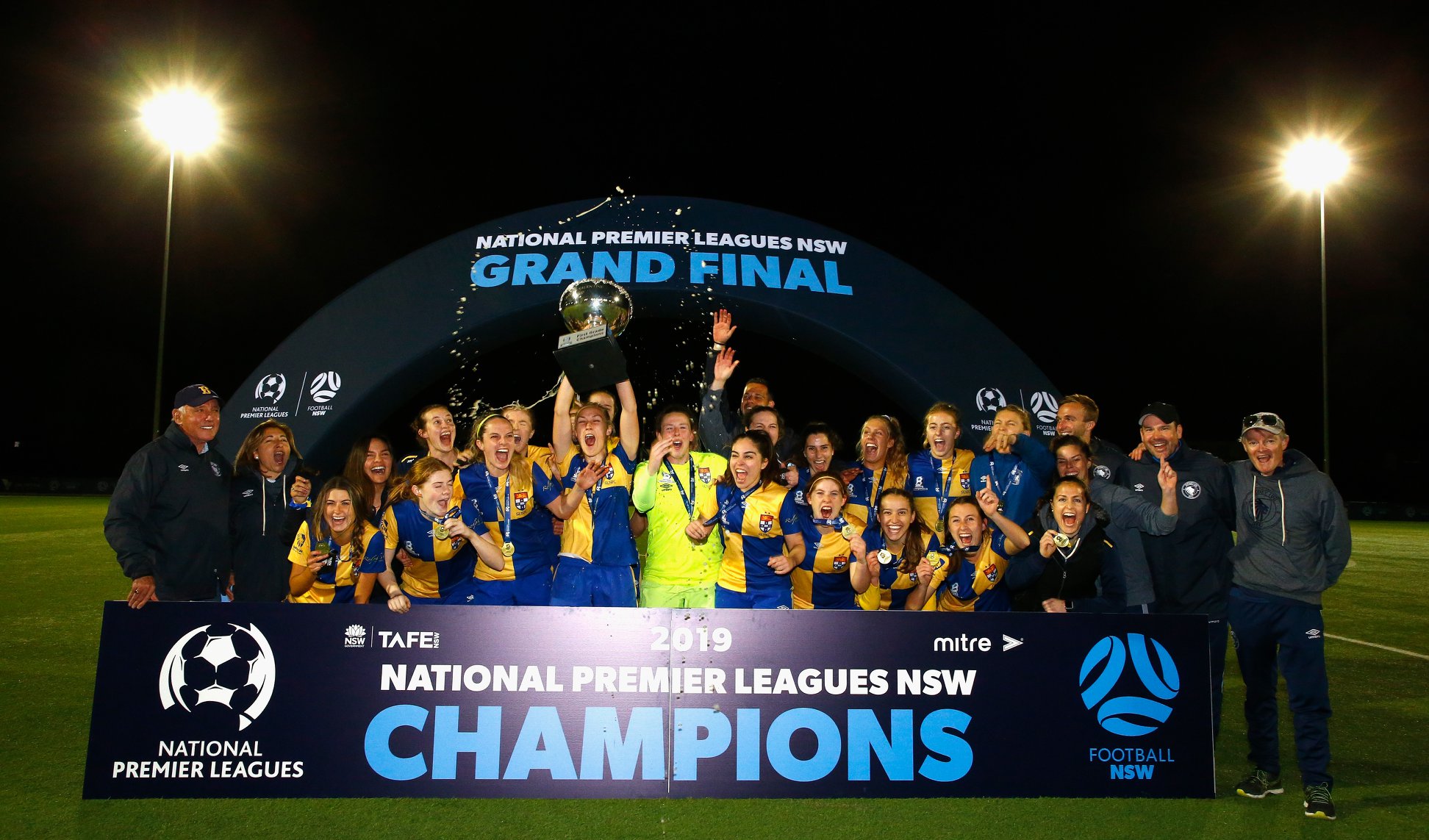
Final score:
Sydney University 1 (Cortnee Vine 84′)
Northern Tigers 1 (Emma Watkins 54′)
Sydney University win 4-1 on penalties.
Teams:
Sydney University: Mel Caceres, Holly Caspers, Teigan Collister, Nicki Flannery, Bianca Galic, Taren King, Annabel Martin, Charlotte Mclean, Sarah Morgan, Courtney Newbon, Julie-Ann Russell, Rachael Soutar, Carla Trimboli, Tori Tumeth, Cortnee Vine, Clare Wheeler.
Northern Tigers: Daisy Arrowsmith, Maddie Bart, Danielle Bartels, Beth Bernardi, Ellie Brush, Eliza Campbell, Sophie de Montemas, Isabella Foletta, Hannah McNulty, Saba Murray, Aimee Phillips, Emma Smith, Malia Steinmetz, Servet Uzunlar, Emma Watkins, Josie Wilson.



